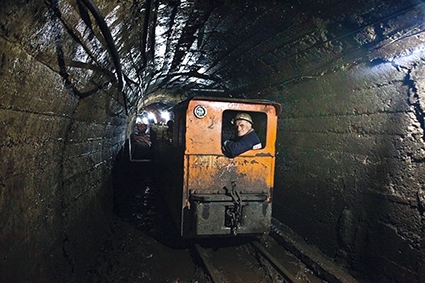Human Rights Watch Supports Georgian Miners on Strike
Human Rights Watch (HRW), an international non-governmental organization based in New York, commented on the recent Georgian miners’ strike in Chaitura, and issued recommendations for the mine-owning company and the Government of Georgia.
Around 150 workers at a manganese mine in Chiatura went on strike on May 15 to demand a 50% increase in salaries and noting their labor conditions there are poor.
HRW conducted research on the working conditions in extractive industries in Georgia, and heard how miners, like those on strike, work shifts of 15 consecutive days, working 12 hours a day underground, including at night.
“During this time, they are required to live in a company dormitory, where, some told us, food is insufficient for the effort required on the job, and restrictions on their movement keep them away from their homes and families,” says the organization.
“The manganese company should listen carefully to workers’ complaints and take steps to ensure safe and fair working conditions. Georgia should bring its labor code in line with International Labor Organization standards and put in place a full labor inspectorate with powers and resources to monitor and enforce all labor rights,” said the HRW.
The NGO added that in April, the United Nations Working Group on Business and Human Rights expressed concern that the organization of work and the dormitory system at the manganese mine were not consistent with international labor standards.
Human Rights Watch stresses that poor working conditions are endemic in Georgia, where labor laws and enforcement remain substandard – even after recent government reforms.
The NGO believes that Georgian law does not provide for mandatory weekly rest or breaks during shifts, and the country’s labor inspectorate is not permitted to check all working conditions.
The recommendations issued by the HRW are as follows:
• The manganese company should listen carefully to workers’ complaints and take steps to ensure safe and fair working conditions.
• Georgia should bring its labor code in line with International Labor Organization standards and put in place a full labor inspectorate with powers and resources to monitor and enforce all labor rights.
Georgian Manganese believes the miners’ strike goes beyond legal frames. According to the company statement, the miners’ demand for a 50% salary increase is too high and they offered employees a 25% increase, which was turned down.
“Last year, a collective agreement was signed between the Georgian Manganese and Trade Unions, based on which the salaries were increased by 10%,” the statement says, adding the agreement envisaged that the miners would not strike for three years.
The company calls on its employees to go back to work, adding if it does not happen, they will take the case to the court.
By Thea Morrison
Image source: deskgram.net












